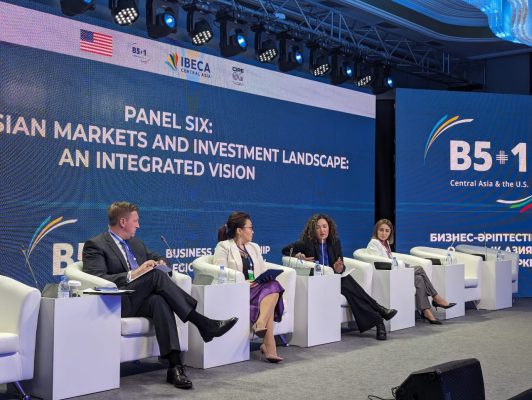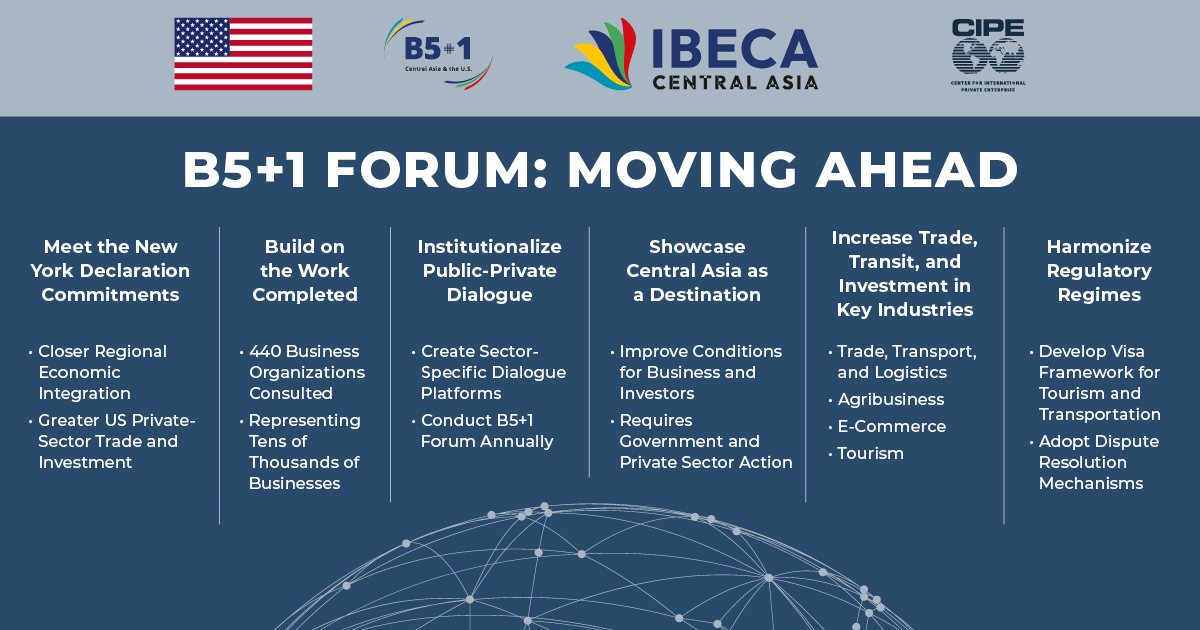 B5+1 is the business counterpart to C5+1, the diplomatic platform for Central Asia countries (Kazakhstan, Kyrgyz Republic, Tajikistan, Turkmenistan, Uzbekistan) and the U.S.The B5+1 Forum held March 13-15 brought together more than 250 leaders of business, investors, policymakers, and experts to talk about barriers to doing business in Central Asia and jointly identify potential solutions. It was the first event of its kind.
B5+1 is the business counterpart to C5+1, the diplomatic platform for Central Asia countries (Kazakhstan, Kyrgyz Republic, Tajikistan, Turkmenistan, Uzbekistan) and the U.S.The B5+1 Forum held March 13-15 brought together more than 250 leaders of business, investors, policymakers, and experts to talk about barriers to doing business in Central Asia and jointly identify potential solutions. It was the first event of its kind.
The group has released a communique that outlines Forum discussions on how best to highlight economic opportunities, draw attention to market developments for new investors, and reinforce policy recommendations for regional cooperation. Participants also identified five sectors likely to be most attractive to international investors and critical for developing regional markets: transportation and logistics, e-commerce, tourism, agribusiness, and renewable energy. The Forum follows a year of intensive consultations with more than 400 business organizations representing tens of thousands companies across the C5+1 countries.
Day One of the Forum focused on the uniqueness of Central Asia, frequent challenges to doing business, the potential of key industries, and the importance of engaging the private sector in reaching C5+1 economic and energy corridor goals, including commitments outlined in the C5+1 New York Declaration of September 2023.
 Day Two invited international perspectives on promoting trade and investment flows in Central Asia, with keynote speeches by Dr. S. Frederick Starr, Founding Chairman of the Central Asia-Caucasus Institute and Silk Road Studies Program and Mr. Henrik Hololei, Hors Classe Adviser, Directorate-General for International Partnerships, European Commission.
Day Two invited international perspectives on promoting trade and investment flows in Central Asia, with keynote speeches by Dr. S. Frederick Starr, Founding Chairman of the Central Asia-Caucasus Institute and Silk Road Studies Program and Mr. Henrik Hololei, Hors Classe Adviser, Directorate-General for International Partnerships, European Commission.
Panel discussions with international financial and development institutions reflected on regional achievements, economic development agendas and emerging partnerships to strengthen regional economic integration. American companies shared insights on investing in priority sectors in Central Asia, while local business associations discussed lessons learned and opportunities for advocacy and public-private dialogue to grow and access new markets. Mr. Timur Zhaksylykov, First Deputy Minister of National Economy for the Republic of Kazakhstan and CIPE’s Managing Director Abdulwahab Alkebsi delivered closing remarks and praised the B5+1 for its progress. Below is a summary of key topics addressed during Day Two.
Panel Four: Community Perspective on International Development
Experts from international organizations discussed strategies for increasing trade and investment in Central Asia, reviewing past achievements and proposing future initiatives. This included presentations on new international initiatives such as USAID’s Future Growth Initiative 2.0, and European Union Global Gateway Fund and the Central Asia Summit, as well as investments related to Central Asia connectivity by the World Bank and European Bank for Reconstruction and Development. All demonstrate efforts to support private sector and increasing interest by International Financial Institutions increased interest in connecting Central Asia with global markets.
Key themes included significant investment in connectivity and climate change mitigation, support for key transport routes development, green energy transition, women’s entrepreneurship and SME development. Recommendations for an improved business environment, economic diversification beyond traditional sectors were provided, as was the importance of building a Central Asian brands to attract foreign investors. Discussions underscored the need to address both internal and external infrastructure needs to ensure sustainable growth and development in the region. This priority is underlined in the context of strengthened relations with key international institutions and commitments of substantial financial support.
Panel Five: U.S. and International Business Community Perspective
American and international business representatives provided valuable insights into investing and operating in Central Asia, focusing on key sectors such as transportation, e-commerce, tourism, agribusiness, and renewable energy. Panelists highlighted potential growth drives and the key role of sectors such as IT and FinTech. Strategic policies and partnerships were also identified as essential elements. During the Q&A session, participants raised important questions related to intellectual property rights and international business laws, which are essential to enhancing the region’s attractiveness to foreign investors. Embracing technology and a balanced approach to “coopetition” (a combination of “competition” and “cooperation”) emerged as good strategies to accelerate Central Asia’s ongoing transformation.
Panel Six: Business Associations Bridge the Public and Private Sectors
This panel explored the role of business organisations in promoting public-private dialogue. Drawing on their experience of working with national governments, panelists shared their views on best practices and innovative solutions to enhance the role of business associations as platforms to represent the interests of their members, both large companies and SMEs. The discussion also explored the evolving business culture in Central Asia, opportunities to leverage youth as a creative driver of entrepreneurship, technological knowhow and an increased focus on global challenges such as climate change. The need for agile leadership to navigate these changes while driving regional integration was highlighted.
Active Participation and Follow On
Attendees agreed that the lively exchanges of ideas during panel discussions and Q and A sessions demonstrated the Forum’s commitment to meaningful dialogue and cooperation. Many speakers stressed the importance of utilizing the creative capacity of private sector and entrepreneurs to propose practical solutions to policy makers to advance regional economic cooperation through businesses.
CIPE is coordinating B5+1 with support from the U.S. Department of State, which released a media note immediately after the conference. CIPE also issued a press release outlining Forum recommendations and the event and communique have received widespread media attention. Meanwhile, the B5+1 website is being continually updated and contains many resources, regional assessments, and the full Forum program.
Published Date: March 16, 2024

